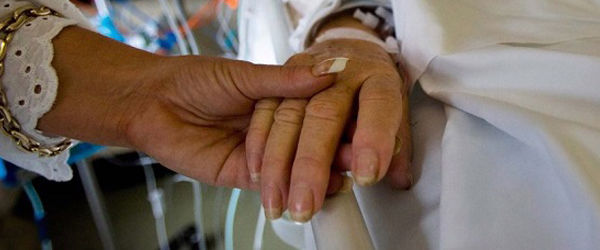As tears started running down her cheeks, Luz Ruiz was consoled by Tung Nguyen. No words. A few seconds of silence. Hands held tightly. Ruiz — whose son was murdered — and Nguyen — who served 18 years in prison for his involvement in a murder — were surrounded by guests and members of the peace and justice ministry of San Pedro’s Holy Trinity Church, sponsor of the Feb. 27 panel discussion on restorative justice.“We invited the folks from the archdiocesan Office of Restorative Justice to inform us of what’s out there, to listen to stories, so that later we can raise awareness about these issues, especially in this time of Lent,” Michael Sylvester, moderator, told The Tidings.Javier Stauring, co-director of the Restorative Justice office, said they are constantly inviting parishes to increase efforts to “raise voices of healing and awareness about the broken criminal justice system and how to make it more restorative.” Parishioners were drawn to the gathering for various reasons. Some wanted information on legislation like SB260, a proposed bill to review cases of those prisoners who have served more than 15 years after being sentenced when they were children to spend 200 or more years in prison. Such sentences, Stauring said, equate to life without parole for minors, a policy overturned in 2012 by the passage of SB9.Others, like Leo Kolowski, came because of recent news reports they had heard about unjust incarcerations. And parish justice and peace ministry member Cecelia Moore wanted to learn what the Restorative Justice office is doing to help rehabilitate prisoners “to foster reconciliation within themselves and with others.”‘You’re in deep, severe pain’For Ruiz, a practicing Catholic, reconciliation started the day she met Nguyen.In the fall of 2005, her 23-year-old son Robert was shot while attending a birthday party of a friend in a supposedly safe area. Members of a gang, some of whom had been invited to the gathering, started shooting after a fight broke up. Two persons were fatally wounded; one of them was Robert. “Please, not my baby, not my son!” she said she started screaming when she received the tragic news from her daughter.“You don’t sleep or eat when something like this happens to you,” she said. “You’re in deep, severe pain.” But the day of the funeral she realized she was not alone. “The church was packed and I learned that not just my family was in pain, but the entire community.”The judicial process took about 18 months, with the offender sentenced to two consecutive life sentences plus one year.Soon after, Ruiz joined a support group for families of victims of crime, but the real process of reconciliation did not began until six years later.After sharing her testimony during a restorative justice conference, Tung Nguyen, who was also a panelist, rose from his seat, went to her and asked her for forgiveness.“For the first time since my son was murdered, someone told me, ‘I’m sorry, I’m sorry for what happened to you and for what you’ve gone through,’” Ruiz said, choking back tears.“I am so thankful for Luz and for her story,” Nguyen added, as a way of introduction. “This is my calling, to connect with people like Luz in order to get the healing for myself.”A path to healingIn the early 1990s, Nguyen emigrated from Vietnam with his parents and siblings. With very little knowledge of English, the low-income Buddhist family settled in Orange County seeking a better life.School turned out to be very hard for Nguyen. Feeling alienated, even among other Vietnamese students, he rejected school and preferred staying at home and helping his parents collect soda cans from street bins for recycling, in order to make ends meet — until he was lured by other kids in school who “were poor like me.”Eventually, he got involved in gang activities and on April 12, 1993 he was arrested with two other kids after a young man was stabbed and killed in a hotel room. Although he was not the murderer, he was sentenced to 25 years to life. Nguyen was 17 years old.For his first five years in prison he would not admit responsibility for the damage he had caused, but at some point, he said, he “got tired of prison life” and started attending school and support groups. He eventually was transferred to San Quentin State Prison and became an active member of self-help groups and involved in faith activities, helping the Catholic chaplain whenever he could. He taught himself to play piano and guitar, joined the church choir and converted to Catholicism.After serving 18 years in prison, Gov. Jerry Brown granted Nguyen parole for good conduct.“That first time I heard Luz speak it broke me into pieces,” he said, “I felt vulnerable and now that I was outside I could see every little thing that I did.”Invited by Stauring, today they both share their testimony together to help educate the community about the criminal justice system and about support groups available for survivors and former offenders.For more information, call the Office of Restorative Justice, (213) 438-4820 or toll free (877) 712-1597.{gallery width=100 height=100}gallery/2013/0329/spholytrinity/{/gallery}

